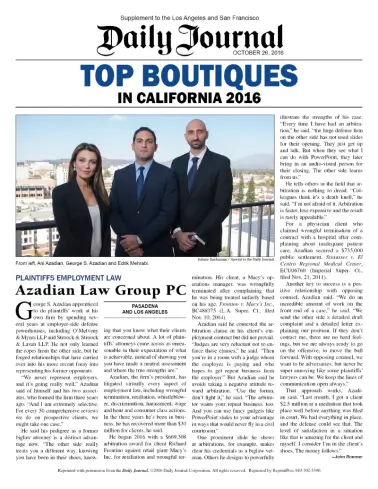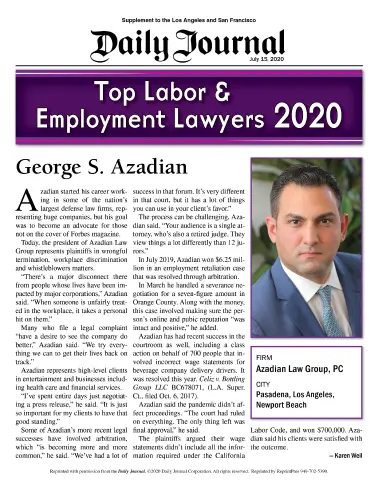Disability Discrimination in the Workplace Sets New Claims Record
Earlier this month, federal officials revealed that they had received a record number of claims dealing with workplace disability-based discrimination.
According to the U.S. Equal Employment Opportunity Commission (EEOC), charges of workplace bias based on disability hit an all-time high for the second year in a row. In 2016, there were nearly 30,000 charges connected to disability discrimination on the job. Of these, the EEOC said roughly 5,700 were resolved in favor of the individual filing the complaint.
The EEOC also revealed that it recorded an uptick in charges across the board, covering the 10 types of discrimination that the agency is tasked with investigating.
In 2016, the EEOC received approximately 91,500 charges of workplace-based discrimination and retaliation overall. Roughly a third of those complaints cited disability.
Workplace Discrimination Based on Disability
There is a common misconception that disabled individuals do not intend to work or that those living with a disability are not as valuable in the workplace as other able-bodied individuals.
However, statistics indicate that, in the state of California, more than 33 percent of disabled individuals are employed, with another 9.5 percent currently seeking gainful employment. These people want to be employed and want to have a positive impact on the U.S. economy.
Unfortunately, many disabled individuals give up searching for work because they feel that they are being discriminated against when interviewing for a position or when working on the job. Employees or prospective employees with a medical condition are also often hesitant to ask for reasonable accommodations, such as medical leave, intermittent leave when the medical condition flares up or worsens, telecommuting, or other forms of modified duty.
Current federal law and California law prohibit employment discrimination based on disability. These guidelines specifically address “qualified individuals with disabilities” – a term that extends to both applicants for employment and hired employees. A disabled person may be considered “qualified” if they meet the skill, experience and education requirements, in addition to other qualifications, necessary for an employment position.
However, the law also requires employers to engage in an “interactive process” with disabled employees. This involves taking the time to discuss the scope of work with the disabled individual and determining any and all job limitations. Once this is established, the employer can help identify potential accommodations.
It is critical that communication is established directly between the employer and employee to help keep the flow of essential information and ensure that any and all appropriate accommodations are considered.
Disability Discrimination Attorneys in Los Angeles and Pasadena
If you or someone you know has dealt with workplace discrimination, including cases based on a disability, then it is in your best interest to seek the guidance of a qualified employment attorney as soon as possible.
That’s where the Los Angeles employment attorneys at Azadian Law Group, PC, can help. Our team of highly-skilled legal employment lawyers exclusively represents executives and employees dealing with all types of discrimination on the job, including cases where the discrimination targets an individual’s disability, the employee’s request for accommodations, or the employee taking medical leave. We can work closely with you to assess the severity of discrimination and recommend a legal strategy that preserves your rights in the workplace. No matter what the situation is surrounding your workplace discrimination, our compassionate attorneys are committed to serving as your legal advocate.
Let’s work together to find a beneficial legal solution to your discrimination claim. For a complimentary preliminary consultation with an employment lawyer, contact the team at Azadian Law Group, PC today by calling 213-229-9031.
Related Blog Posts
Requesting a reasonable accommodation for a disability is a protected right under both federal and California state laws. However, some...
Read MoreIn today’s rapidly evolving world, technology has become a powerful tool in addressing various forms of discrimination, including disability discrimination....
Read More2016, Home-improvement giant On May 13, Lowe’s agreed to pay $8.6 million to settle a disability discrimination lawsuit brought by...
Read MoreTypes of Cases Handle By Employment Lawyers in Los Angeles, CA
The following presents an overview of the broad range of employment law cases that our employment attorneys are experienced at overseeing and favorably resolving.
Wrongful Termination
Wrongful Termination Lawyers in Los Angeles, CA Attorneys at Azadian Law Group who have filed wrongful termination lawsuits acknowledge that unfair termination can significantly impact an employee’s life. It can…
Age Discrimination
Age Discrimination Lawyers in Los Angeles, CA Azadian Law Group, PC regularly represents clients throughout Los Angeles, CA, who are the victims of age discrimination in the workplace. At Azadian…
Pregnancy Discrimination
Pregnancy Discrimination Lawyer in Los Angeles, CA At Azadian Law Group, PC, our pregnancy discrimination lawyer in Los Angeles, regularly represents clients who are the victims of pregnancy discrimination in…
Sexual Harassment
Sexual Harassment Attorney in Los Angeles, CA The Los Angeles Sexual Harassment Lawyers at Azadian Law Group, PC, know that in today’s modern era, some people often make the mistake of…
Racial Discrimination
Racial Discrimination Lawyers in Los Angeles, CA Azadian Law Group, PC regularly represents clients throughout Los Angeles who are the victims of racial discrimination at work. The Los Angeles Race…
Disability Discrimination
Disability Discrimination Attorneys in Los Angeles, CA There is a misconception that disabled people do not want to work or that disabled individuals simply cannot or will not be as…
Praise from Our Clients
Who We Represent
At Azadian Law Group, we are dedicated to upholding the rights and interests of employees in the workplace. Our expertise in employment law positions us as staunch advocates for those facing unjust treatment in their professional environments.
Whether combating workplace discrimination, addressing unfair termination, or negotiating equitable compensation, our team is committed to ensuring that every employee we represent is treated fairly and respectfully under the law.

Step 1
Explore our comprehensive range of legal services to find the specialized support you need.
Step 2
Arrange a free initial meeting with our experts to discuss your legal situation.
Step 3
Receive a custom strategy specially created for your case by our legal experts.
Call Us Now 213-229-9031
Tell Us Your Story
Speak out for justice. Your story can be the start of a new chapter of workplace fairness.




